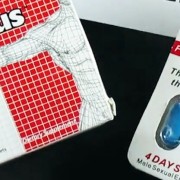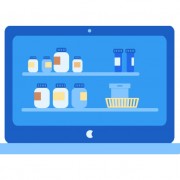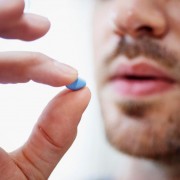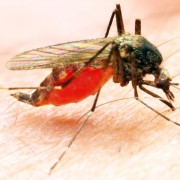Is It Safe to Combine Viagra With Alcohol?
For most men and women, romance is an inevitable part of prelude to a sexual intercourse. Romance is always meant as candlelight, sweet music and drinking 1-2 glasses of red wine. Viagra might be an inevitable part of such picture as well — if a man drinks moderate numbers of alcohol. But what number is enough and what is overmuch?
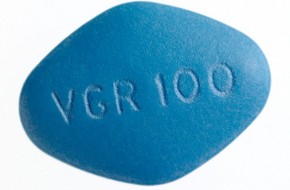
from $1.90 to $0.36
How does alcohol impact affect sexual function of males?
Regular (if not to say chronic) alcohol use is the widespread reason of sexual disorder. Regular alcohol use and binge drinking can provoke:
- The issues with testicles. If a man has alcohol addiction, in time his testicles can shrink or even reach atrophy state. Large number of alcohol decreases the volume and sperm count as well.
- Decreased testosterone degrees. Testosterone produced in the testes is important for a proper work of sexual organs and male semen. Decreased testosterone levels may feminize male’s body resulting in bigger breasts and bodily hair loss.
- Prostatitis stands for a condition when male’s prostate glands are inflamed. The signs of prostatitis are pain, bulge, urinal disorder and sexual problems (including impotence), in general. Alcohol also impacts other organs of the body.
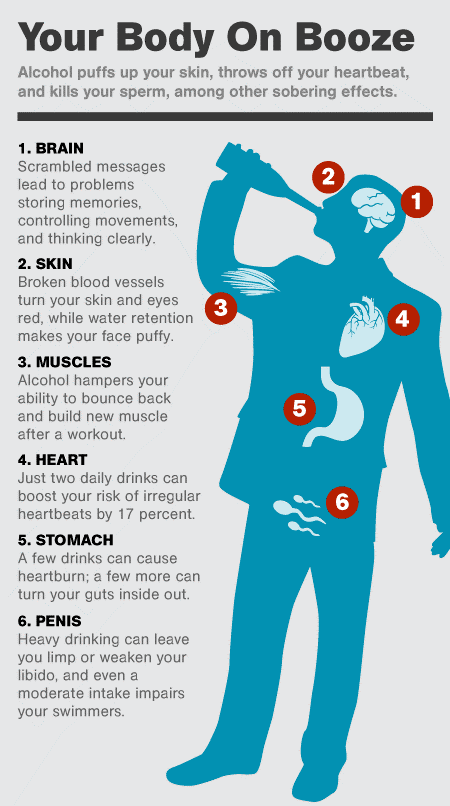
Medical trials about interaction of alcohol and Viagra
1. During 25 years researchers from Loyola University were monitoring the consequences of regular alcohol use on the reproductive function of men. The outcomes showed that there’s no obvious indication that Viagra effects are not influenced by alcohol (read more about Viagra here). The trial publicized in medical Pharmacology and Therapeutics established no adverse reactions between Viagra and red wine. But it’s better to limit the intake of alcohol (including red wine) while applying pills of Viagra.
2. It’s not only advisable to limit your drinking while taking Viagra, it can in addition help you combat ED and various sexual issues. Another trial publicized in the Indian Journal of Psychiatry concluded that 72% of men having severe alcohol dependence were in addition experiencing few forms of sexual disorder. This resulted not only in erectile issues but also in premature ejaculation, loss of libido and difficulty with acquiring orgasms.
The trial proved also that men who consume 3 servings of alcohol or more a day are probably to encounter sexual disorder than men who don’t drink. The follow-up trial showed positive dynamics after 2-3 months of abstinence; the trial’s participants didn’t have sexual issues in the control group of men who generally abstained from drinking.
What to expect from mixing alcohol and Viagra pills?
Viagra stands for the most famous therapy for men with erectile disorder. Nevertheless, alcohol is one of the reasons why you might be experiencing erectile disorder in the first place:
1. Decreased blood stream triggered by alcohol.
Drinking alcohol lessens the amount of blood that stays inside the penis, which makes it harder for you to get an erection. If you’re taking Viagra because you’ve had erection issues in the past, you should abstain from alcohol.
2. Both Viagra and alcohol are blood thinners.
Viagra lessens your blood pressure, alcohol does the same. If your blood pressure gets too low, you may get through such bad symptoms as severe headache, heart palpitations, wooziness, light-headedness and even fainting. Having such side consequences of Viagra isn’t just possibly dangerous – but it certainly doesn’t improve your sexual functionality.
3. Only limited number of alcohol for Viagra customers is permitted.
It is essential that you limit your alcohol intake while you are taking Viagra but it’s safe to enjoy a small amount of alcohol, like 2-3 servings at most.
4. Alcohol badly impacts liver function.
The liver and kidneys work to delete medical preparations from the body. With Viagra, 80% of the active substance is cleared from the body by the liver. If this organ does not function properly or is being busy with alcohol removing, then the concentration of sildenafil in plasma can reach dangerous levels. It is essential to realize that alcohol use can eventually compromise the liver function. If alcohol is consumed it should be done responsibly and in moderation to prevent any issues with the liver and any unwanted or dangerous consequences from elevated Viagra concentration in blood.
Interesting fact: Chinese therapists thought of adding Viagra into alcohol
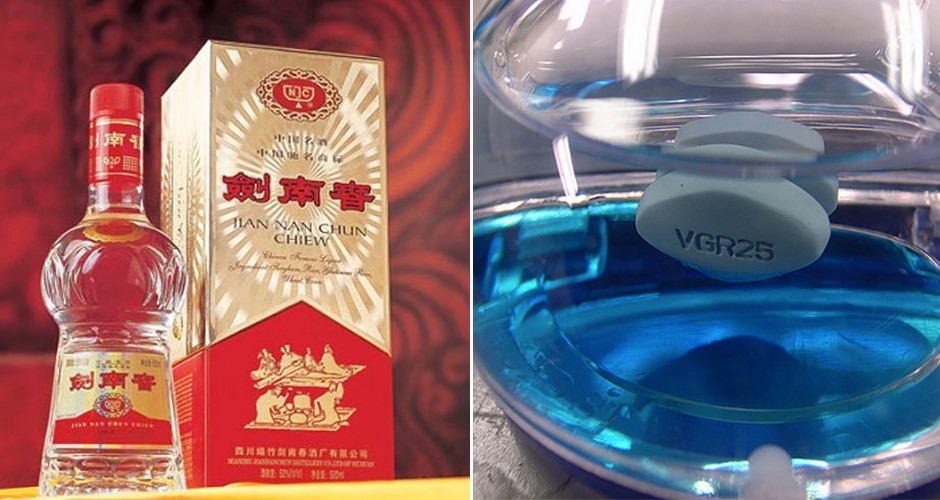
In Guangxi Province people discovered Viagra in bottles of baijiu (China’s most famous alcoholic beverage). sildenafil recognized as an anti-impotence medical preparation was established in 3 baijiu products at the Guikin Alcohol Plant and Deshun Alcohol Plant in Luizhou, Guangxi Province, China.
According to a report by Reuters, about 5,300 bottles of alcohol were confiscated by authorities who in addition found packets of powdered sildenafil. They said that bottle was worth up to 700,000 yuan (about £72,000).
The Liuzhou FDA office said the powder with Sildenafil was found in 3 various kinds of baijiu and that the labels on all bottles had the remark of “health-preserving qualities”.
Viagra is forbidden in China, and as a food additive it is not suitable for people with cardiovascular issues. But bajiju’s manufacturers claim that all their clients were satisfied with the product and had no negative consequences or health issues after drinking alcohol with sildenafil in it. On the contrary, Viagra in bajiju assisted men to loosen up and get a better sexual function even with the diagnosis of erectile disorder.
It seems that what regards mixing Viagra and alcohol, a glass of wine may help you loosen and enhance your sexual encounter. However, moderate/heavy alcohol use is counterproductive for reason you apply Viagra in the first place.
Remember! You can take no more 2 glasses of red wine or 1 glass of beer before or while applying Viagra pills. Along the lines of such scenario you’ll be safe from any issues.
Drink in moderate amounts when taking Viagra
If you take Viagra in conjunction with heavy alcohol consumption, there are two different substances in the body that simultaneously widen the blood vessels. This in itself does not have to cause any problems, especially if you are healthy. However, it is important that you adhere to the printed dose and not overdose when alcohol is combined with Viagra. Overdose of Viagra and alcohol can lead to unpleasant side effects, such as altered visual acuity and headache. However, Viagra and Spirits do not tend to cause any problems for patients to drink moderately and adhere to the daily recommended dose in one’s prescription.
However, there is always a risk of side effects when taking drugs, including Viagra, and there is also a risk that these can worsen if you drink alcohol, such as heart palpitations, low blood pressure, dizziness and nausea. When sildenafil goes out of the body, it also reduces the possible side effects.
Alcohol with Viagra and other drugs – is it dangerous?
FDA clarifies that you should not drink large amounts of alcohol when taking Viagra because it may reduce your ability to get erection. Many people wonder if drinking alcohol may be dangerous when taking Viagra. It is common for you to want Viagra when consuming alcohol; a nice dinner with wine for or an evening out in town is a common arrangement before six and it may be good to know what’s happening in the body.
Viagra is taken to get a good erection and it is thanks to the active substance sildenafil as the blood vessels and it becomes easier for blood to circulate and reach the penis. When adding alcohol to the equation, similar reactions and then counter reactions occur in the body. When you feel the first effect, relaxation is the most obvious feeling. It is also noticeable that you get hot. This is a direct reaction to the liver starting to burn the alcohol in combination with the blood vessels widening and the blood can flow more easily through the body.
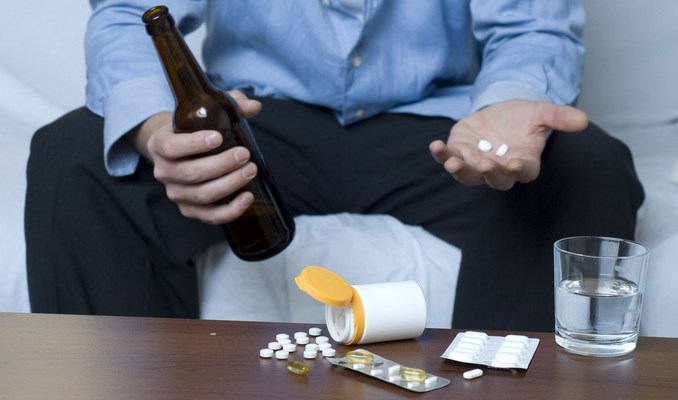
The effects of some drugs may change when taken with alcohol. When a drug and alcohol affect each other, this usually results in heavier side effects of the drug and increased alcohol confusion. Alcohol acts both on the brain by producing its effect and on the body in general by blending the blood vessels and irritating the gastric mucosa.
The interactions, or the interaction between alcohol and drugs, may be due to both the drug and alcohol blocking important body functions such as reactivity, vigilance and breathing. The interaction may also be due to the fact that alcohol changes the metabolism of a drug in the liver. This leads to the concentration of the drug in the body being different from that taken in the same dose without alcohol.
Medicines and alcohol can enhance each other’s effects. What effects are enhanced depends on which drugs are combined with alcohol. It is known that simultaneous intake of alcohol and analgesics that contain morphine, methadone, petidin, ketobemidone, oxycodone, dextropropoxifen or pentazocin can give greatly enhanced effects with the worst risk of respiratory paralysis and death. This can occur already at the usual dose of the drug in combination with alcohol levels in the blood of 1-2 ml.
Strong painkillers should never be combined with alcohol. In recent years particular attention has been paid to the combination of dextropropoxifen and alcohol.
There is a risk of serious complications with respiratory paralysis in combination of alcohol with the older sleepers, so-called barbiturates. Examples of such substances are buteneemal, diemal, enhexymal, phenobarbital, heptamal, hexemal, mebumal, pentymal and tiomebumal.
Some medications may reduce the ability to concentrate and the degree of alert already at moderate amounts of alcohol. Such combinations can also cause strange and unusual behaviors. In chronic alcoholism, sometimes a reduced sensitivity to certain sedatives is seen. This is a reason why drugs containing clomethiazole can be used in the treatment of alcohol withdrawal.
The attenuating effects of the elderly antidepressants may also be enhanced by alcohol. This already occurs at low doses of both alcohol and drug. So-called neuroleptics are used in psychosocial treatment. It is suspected that the risk of adverse reactions, including muscular rigidity and disorders resembling Parkinson’s disease, may increase during concomitant alcohol use.
A new societal problem is the abuse of anabolic steroids, which in high doses can induce aggressive behavior. This can be particularly noticeable when using alcohol at the same time. Some allergic agents (antihistamines) that cause drowsiness can lower concentration and alertness even in moderate alcohol levels.
Alcohol may enhance the possible side effects of a drug, as it is the case with phosphodiesterase type 5 inhibitors, the class of drugs where Viagra belongs. Most drugs that inhibit inflammation and used in rheumatic and other pain in joints and muscles have, like alcohol, effects on platelets. This means that the risk of bleeding can increase in cases of accidents, for example.
Alcohol irritates the gastrointestinal mucosa and should therefore not be combined with drugs that may cause gastrointestinal catarrh or triggering gastrointestinal bleeding. The most important example is acetylsalicylic acid, which is found in many common vomiting tablets.
A relatively moderate overdose with the analgesic agent, the paracetamol, gives an increased risk of liver injury. Alcohol intake further increases this risk. Therefore, people with regular and prolonged overuse of alcohol should avoid swallowing tablets with paracetamol.
Some antihypertensive drugs lower this by widening the blood vessels. Even alcohol has this effect on blood vessels. Therefore, such antihypertensive drugs may cause painful drop in blood pressure. The same problem may occur in patients treated with nitroglycerin.
Alcohol degradation is inhibited. Alcohol is broken down into the body in two steps. In a first step, acetaldehyde is formed and in a second step, acetaldehyde degrades 2-acetic acid. Some drugs may inhibit this breakdown.
How alcohol and Antibus affect each other have been studied in detail. The active substance in Antabus is disulfiram, which inhibits the second step in the degradation of alcohol. This causes acetaldehyde to accumulate in the body and causes a number of unpleasant symptoms such as severe facial redness, shortness of breath, palpitation, headache, nausea and vomiting. Symptoms already occur in very low alcohol doses in patients treated with Antabus for their alcohol dependence. Commonly used alcohol doses together with Antibus can be directly life threatening.
It has previously been reported that the stomach ulcers containing cimetidine and ranitidine inhibit the first step in alcohol degradation. There is some kind of protection against alcohol in the gastrointestinal tract, where a certain enzyme breaks down the alcohol so that only a portion of the amount taken is entering the bloodstream. This part increases slightly in patients taking these stomach ulcers but is of no relevance to the treatment of the drugs. However, in principle, patients with stomach ulcers should always avoid alcohol.
The drug’s degradation is affected. Alcohol is mainly degraded by an enzyme that is not involved in the sale of drugs. However, some alcohol degradation occurs through the liver enzymes that break down certain medicines. Alcohol can either decrease or increase the breakdown of such drugs depending on the amount of alcohol and partly during the alcohol intake.
After a few to a few days of alcohol intake in intoxication doses, there is generally a reduced ability of the patient to break down certain medicines. This results in the concentrations of these agents becoming higher than normal in the body, with the risk of enhanced effects and side effects. This type of interaction has been demonstrated for, among other things, the blood clotting agent warfarin, the antidepressant drug amitriptyline and the antidepressant drug diazepam.
Long-term alcohol consumption makes medication difficult. In moderate to high daily consumption of alcohol during weeks to months, the opposite phenomenon is rarely seen. This means that the patient’s drug degradation goes faster than it normally does in a sober state. It is thought that this is due to the fact that alcohol stimulates the formation of enzymes that break down drugs. This effect remains for several weeks after alcohol consumption has been interrupted. Eventually, however, liver enzymes return to normal (in this case lower) function. This can cause problems with drug dosage, as the dose may vary depending on the alcohol intake. It will be harder for the doctor to set the correct dose on the patient. Examples of drug substances whose decomposition can be accelerated by alcohol is phenytoin against epilepsy and warfarin against blood clots. If alcohol consumption is so high that it leads to severe liver damage, the ability to break down drugs eventually decreases to become very slow in cirrhosis.
Alcohol, Viagra and elderly patients
An international article on alcohol and drug interactions in elderly patients emphasizes that up to 30% of the ages between 65 and 85 years old use alcohol and drugs at the same time, which could interact with each other. High priority in the prevention of such interactions is, of course, to avoid such alcohol habits that can impair the disease itself. Here you can exemplify diabetes and related erectile dysfunction, or erectile dysfunction related to other causes, hypertension, gastritis ulcer, sleep disorders and depression. Elderly patients are often treated with multiple drugs at the same time due to several diseases. However, such polypharmacy may sometimes need to be remedied. Physiological factors mean that one and the same alcohol levels can cause higher blood concentrations in elderly patients compared to younger ones.
Always check the medication description under the heading ‘What substance contains your medicine.’ In principle, however, you should be careful about alcohol in connection with medication.
To sum it up:
- Viagra will work better without alcohol.
- Alcohol is not the best friend of your erection.
- If you absolutely must have a drink, let it be no more than 1 beer or 2 glasses of wine.
- Alcohol can affect Viagra so that its side effects are enhanced. Other medicines that should never be combined with alcohol include: strong painkillers and sleepers. Combination may in the worst cases (high doses) result in respiratory paralysis and death.
- Alcohol irritates the gastrointestinal mucosa and increases the risk of bleeding. Therefore, you should not drink alcohol while taking medicines that may cause gastrointestinal or gastric haemorrhage. An example is acetylsalicylic acid found in many common painkillers.
- People with regular and prolonged overuse of alcohol should avoid paracetamol pain relief tablets.
- Alcohol intake can also complicate drug dosage by affecting the metabolism of the liver in the liver. This causes difficulties for the doctor to prescribe the correct dose.
- There is a widespread misconception that antibiotics and alcohol cannot be combined, but nothing suggests that it is so. However, a basic rule is never to consume alcohol in larger amounts in infectious diseases.
- Talk to your doctor if you are unsure whether it is inappropriate or dangerous to drink alcohol while taking your medicine.




